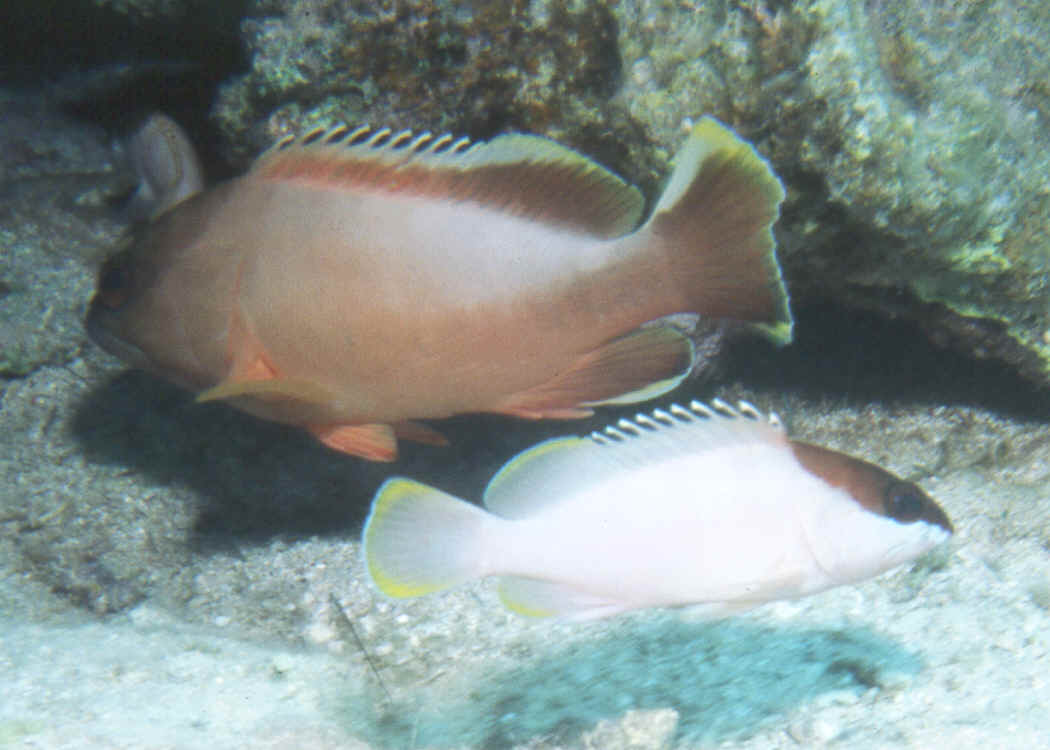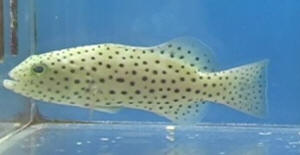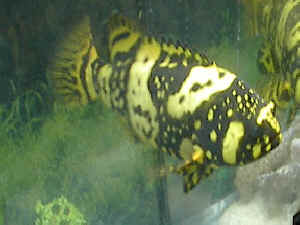|
FAQs about Basses of the Genus
Epinephelus
Related Articles: Basses
of the genus Epinephelus,
Related FAQs:
A couple of color phases of Epinephelus
fasciatus in the Red Sea
|

|
|
bumblebee grouper in freshwater?
6/23/17
Hello Neale,
<Howsit Ben; will send this on to Neale as well>
Warm greetings to you and all the good people at WetWetMedia,
<Cheers>
Yesterday I went to the fish shop in Jakarta, where I saw the horseshoe crab and
the blind many-toothed goby. Unfortunately I was unable to find the guy who sold
them. Many of the fish sellers went home to prepare for Muslim holiday, so the
place was not as crowded as usual.
<Ahh!>
Nevertheless, I still saw some interesting fishes in other shops, such as these
pair of lovely bumblebee grouper (Indonesians call it "Kerapu Emas"/gold
grouper), which lives in a freshwater aquarium (pictures attached).
<Mmm; this "monster bass" won't live for long in freshwater. Tis an all
saltwater species; that suffers internal damage otherwise>
This is very strange and interesting to me, I thought these groupers are sea
fishes, but the fish guy swore up and down that he had these groupers
for years in freshwater.
<I doubt this; t'would be huge or dead in this time>
He also told me that he had successfully kept a barracuda (he called it "Alu
Alu", the Indonesian name for it) in freshwater for a long time, and he will
show it to me the next time I visit his shop.
<I'd like to see this species>
I wonder how did they achieve such feat? Is it because of some kind of chemical
tricks (which he did not tell me), or is it because those species in question
does have a wide range of tolerance to different degrees of salinity?
<Many marine fishes do make forays up rivers, past river mouths where
there is less salty conditions. Again, not permanently>
Thank you and Best Regards,
Ben
<Thank you for sharing. Bob Fenner>
|
 |
QUEENSLAND GROUPER WITH BLACKTIP SHARK
6/17/12
Hi Bob and Crew, hope all is great this weekend, I need our advice.
<Ok>
I received a 11" Queensland Grouper
<Wow; some shipping cost now!>
from Quality Marine 2 days ago, the fish is doing great, I putted him on
quarantine but the final
tank for this fish will be with a 30 " 3 year old Blacktip Shark;
the question is: Do you think the Grouper will be safe with the Blacktip
or I should grow the grouper a bit more separate and if so to how many
inches?
<Depends on the size of the system and amount of cover mostly (and
thirdly, the temperament history of the Carcharhinid... has it been
easygoing to date?). If the system is small enough (not big enough to
allow the shark to
get out of view and launch into attack mode (let's say less than twelve
foot long on both L and W dimensions), and/or there's lots of habitat,
the bass is likely fine>
Thanks for your help and have a nice weekend
Wilberth
<And you, y tu, my friend, mi amigo. Bob Fenner>
RE: QUEENSLAND GROUPER WITH BLACKTIP SHARK 6/17/12
Thanks for your answer Bob, the tank is 9 by 8 foot not too many hiding
places
<I'd add some rock... for caves>
and about the temperament history of the Carcharhinid, he has became
aggressive since the last 2 years, eating some show size fishes like
Orbicularis Batfish, Hawaiian Black Trigger
<Both much slower and less aware than the new Serranid>
and its own remora!
<Yikes!>
I thought that because of the Grouper's temperament, it will be safe but I
guess this is not the case so regarding Grouper´s size what do you think
it must measure to be "respected" by the shark?
<Better for now that it is small enough to hide... I give you better
than even odds that it can adapt to this system, tank mate if there's
room to get out of it sight, and hide>
Gracias amigo Bob
Wilberth
<Nos vemos. BobF>
|
An ID please - 09/25/08 Hello Crew, <Hi
Andrew.> On the other side of the fence for a change, can
anybody provide an ID on the fish in the attached picture? The
spots are actually blue, although they don't look it on the
pic. Thanks. Andrew <Coloration and body shape remind me of a
subadult (not entirely juvenile anymore) Coral rock cod
Epinephelus corallicola or related species (like E. howlandi).
Does it have a first dorsal fin with spines (how many spines?
cannot see one on the picture)? How's the end of the caudal,
round or straight? Origin and especially size would be useful for
an ID. Cheers, Marco.>
|
 |
|
Re: An ID please. Epinephelus -
09/26/08 II Hey Marco, nice to hear from you mate.
<No problem.> Thanks for the info, all we have is the
picture of it, it's a purchase from saltwaterfish.com, and
they had it marked up as a spotted grouper, however, that was a
little too generic and we all wanted another opinion...
<Certainly. I cannot understand the aversion against proper ID
and scientific names by some traders, wholesalers etc. Time is
money likely.> Sorry I cant give you more info.. however, what
you've provided is great. <Thanks. If you get more
information about the fins, feel free to mail again.> Hope
your well, Andrew <See you in the dailies. Marco.>
|
- Fish Questions - I have a few questions I was wondering if
you might be able to help me with; I just recently bought a 2 inch
specklefin grouper (Epinephelus ongus) for my fish only tank; I was
wondering if they keep their color as adults? <Their coloration does
change a bit as they get older.> And if you think he'll be less
aggressive than my old miniata grouper (I recently donated to my local
aquarium)? <Hard to predict. Is still a bass with a large
mouth...> Also you think in later years him and my blood red hawk
fish will ever have problems? <Again, depends on what size it tops
out at - in the wild you can expect about 12" - even at half this
size it could easily consume the hawkfish. Personally, I don't
trust groupers/basses with anything smaller than them.> Thanks for
your time.... <Cheers, J -- >
- Giant Mouth with an Appetite - Hi all! Just got done
reading some more articles on your wonderful site, the last being about
groupers and such. I have a "black tipped grouper"
(Epinephelus fasciatus). It is about 7" in
length. Knowing the general rule of "if it can fit in
it's mouth...", I purchased another fish recently
that I assumed the grouper could not eat. This was a
particularly large damsel (about 4") and mean as can be imagined-
if you put your face near the tank he would come charging and slam into
the glass about 5+ times trying to get your eyes!.. same
with reaching in the tank.. Anyhow, the groupers mouth opens fairly
large- about the size of a quarter.. the damsel being nearly 3"
tall not including fins obviously is much bigger than that. To make a
long story short- the grouper apparently got mad about the damsel
bugging him and is now in the process of digesting him.... So the moral
of the story is if ya gotta grouper, make sure other fish are bigger
than the grouper- I would have bet anyone or anything that there
wasn't a chance of this happening - but the fin in the
throat and the big fat belly prove it I guess. PS: can this kill
AHHHHHH? <Doubtful.> PSS: My wife asked our two year old daughter
to name it - she looked at it covered her eyes with both hands and
screamed AHHHHHHHHHH at the top of her lungs. She does this
whenever we ask her the fishes name. Thanks <Ah yes... thanks for
sharing. Is a common tale, and one that few people think their little
groupers are capable of duplicating. Cheers, J -- >
|
Name that bass! Mr. Fenner, What's the name of this
grouper???? Michael Ferncase <''}}}< <It's a
real "big boy"! The Brindlebass or Lanceolatus Grouper,
Epinephelus lanceolatus... sold by the pet-fish biz as a cute
small "bass" but grows to 2.7 meters in length, more
than 400 kg.! Bob Fenner, not quite that big>
|
|

|
Fw: Fish Story
http://news.com.au/common/story_page/0,4057,3531653%255E421,00.html
<Thanks for sending this along Kel... any interest in hauling down
to here with us in March/April? I am not petting (or pestering) this
grouper! Bob F>
Re: Fw: Fish Story Giant groper eh? I would hate to be groped
by a grouper. <Me too. Bob F> Jason Kim President AquaC, Inc.
Epinephelus marginatus en Deutschen Dear Mr. Fenner, I am
searching for the German name of Epinephelus marginatus. Could you be
so kind to help me? <Riesen-Zackenbarsch Mein Herr:
http://www.fishbase.org/ComNames/CommonNamesList.cfm?ID=6rginatus&stockcode=6792
Wiedersen. Bob Fenner> Awaiting your answer Sincerely Dr. Bruno
Weyers
Yellowfin blue grouper Bob, last June i bought a 3-4 inch
flavocoeruleous grouper not surprisingly it has grown quickly and is
now about 9 inches long but my question is is it usual for them to lose
the yellow in their fins so quickly mine was almost completely blue
within four months , i ask because i have pictures of these fish in
some good divers guides and they still have yellow fins and going off
the scale of the pictures are clearly larger than mine but with
magnificent amounts of yellow, thanks for your time....Graham Hannan
<Yes... Epinephelus caeruleus can have very nice color for years,
many inches in size (approaches three feet in length in the wild)... I
have a pic of a two foot plus individual taken a few years back at the
Wilmelma Aquarium in Germany that is gorgeous still... You may be able
to reverse the color loss by supplementing the fish's foods with
vitamin preparations (soak in Selcon, Microvit, Zoecon or such for a
good fifteen minutes ahead of offering.) And of course, the usual
statement here concerning keeping water quality optimized and
stable... Bob Fenner>

